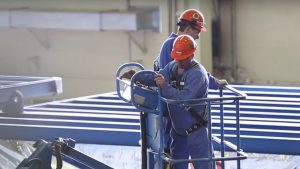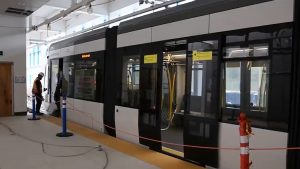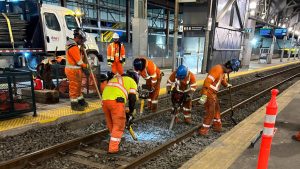The Mechanical Contractors Association of Canada (MCAC) and the Canadian Institute of Plumbing and Heating (CIPH) recently told the federal Standing Committee on Industry and Technology that net-zero buildings will not be achieved without major new investments in training, incentives and promotion to attract new workers.
“Our member companies are simultaneously very busy and also struggling,” said Tania Johnston, CEO of the MCAC. “We face major labour shortages, and the products and supply chains that our members rely on have taken a beating.
“To help small businesses in our sector we need a co-ordinated plan with federal and provincial buy-in that helps more skilled workers in trades like ours that are especially important to solving Canada’s problems – building more housing and transitioning to a low-carbon economy.”
BuildForce Canada estimates 260,000 skilled tradespeople are expected to retire by 2030, she told the committee.
“We face both a retirement challenge and a training challenge,” said Johnston. “In plumbing and mechanical trades, the average age is higher than that of most other trades, and we expect the problem to be even more acute in our sector. We estimate that one-in-five people in the plumbing and mechanical trades is preparing to retire in the next five years.”
The sector needs increased funding for skilled trades training and promotion.
“We are beginning to see the cracks,” Johnston noted. “Inflationary pressure is driving costs up for consumers. When our members don’t have access to enough workers for a project they will either have to pay more, driving up costs directly, or forego their bids, which causes price increases due to less competition.”
Ralph Suppa, president and general manager of the CIPH, said the sector has experienced major supply chain challenges, especially during the early stages of the COVID-19 pandemic.
“The problems we face now are potentially more serious,” Suppa told the committee. “They do not result from the rapid increase in demand for products, but rather from structural problems like regulatory fragmentation (across provinces and municipalities) that limit our members’ ability to deliver goods to market in an efficient and cost-effective manner.
“Practically, regulatory fragmentation hurts businesses, workers, and consumers…The burdens we face now will only be amplified as more housing and ICI buildings are brought online and as consumers race to upgrade their homes and businesses.”
He asked that when the government develops policies and incentive programs, the industry be consulted early on.
“We want to bring some practical solutions that not only keeps our businesses afloat and competitive but also to ensure we are meeting proper guidelines as we go across the country,” Suppa said.
“We need departments to work closely together and to encourage alignment between provinces on adopting the National Building Code and model codes at the same time, and not on alternating cycles. It is concerning that different approaches are required between some provinces and territories and even within their borders.”
Labour mobility was another issued that was repeatedly raised by committee members
“We’re trying to work towards that. We’re not there yet but were trying to get all the provinces on the same page to recognize apprenticeships, journeypeople as well to recognize their credentials across the country,” said Suppa, adding the same is true for south of the border. “We should be able to recognize Canadians going into the states and Americans who come to Canada with the same credentials.”
A national strategy is needed he told the committee.
“We have been piecemealing this and I think we need industry and government, provincially and federally, together to talk about these things,” he explained. “What we are trying to do is create a level playing field right across the country to break down those barriers.”
MCAC members say there is a shortage of refrigerant mechanics and many Canadian industrial contractors are looking to the U.S. to find workers. Johnston suggested the government address this by speeding up the process for the Temporary Foreign Worker program.
She was asked what the industry needs from the federal government to fill the skills shortages.
“One of them is marketing around the skilled trades,” said Johnston. “There are a lot of technical aspects to the mechanical contracting trade as well if you’re not interested in getting your hands dirty. There are all kinds of new technologies and office work, project management, estimating work which is quite attractive as well.”
Apprenticeship funding is also needed. She also said the government needs to look at what it will take to get to the net-zero capacity it wants to reach.
“Are we ready to reach that and what we can do to upskill those potential employees?” asked Johnston. “We need to understand exactly where we need to be and what we need to do to get there.”











Recent Comments
comments for this post are closed